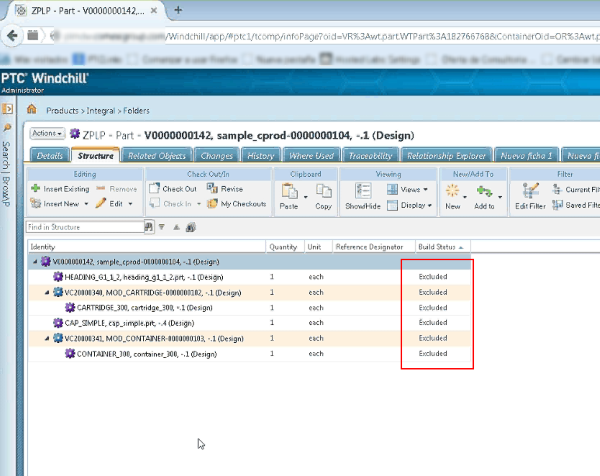In today’s highly competitive marketplace, customers are demanding more customization options. In order to stand out, product and software development tools must not only support variants but also provide efficient variant management capabilities. PTC’s Windchill and Codebeamer are great examples of the successful implementation of variant management. Let’s dive into the importance and benefits of managing variants.


What are Product and Software Variants?
First, let’s explore what variants are. Software and product variants refer to different versions of a software application or a product. These configurations cater to the different needs or preferences of organizations. Product variants are modifications of a “master” product and often include differences in material, color, or performance level. Options, which will come up later, refer to choices or alternatives available for specific components of a product. Options may be discrete or non-discrete. Discrete options are limited to a fixed set of predefined choices, while non-discrete options are not, making them more flexible. The difference between options and variants is that variants are specific combinations of options resulting in a distinct product configuration. Software variants are specific versions of a software application designed to address different user needs, environments, or markets. They often share a common codebase.

What Are the Benefits of Variants?
As previously mentioned, customization is in high demand, and variants can help with this. Variants help meet the diverse needs of customers, allowing them to easily customize a product or software. Offering variants provides a competitive advantage over other product or software development services. Additionally, variants can help companies reach broader market segments. Lastly, variants encourage continuous improvement, driving innovation.
What is Variant Management?
Once they are created, variants must be managed. Product variant management is the process of managing variants throughout the product lifecycle. Efficient variant management enables organizations to provide a more diverse product portfolio to meet their customer needs. Software variant management involves managing the creation, maintenance, and evolution of different software product versions. Its goal is to meet diverse needs while ensuring consistency across variants. By strategically creating and managing variants, companies can better serve their customers and enhance their market presence.
Variant Management with PTC Windchill
Product Variant Management in Windchill
Windchill includes many capabilities for managing product variants. Its main configuration concepts are modules, configurable BOMs, and configurations. Modules are a collection of components allowing users to combine different variants. Configurable BOMs are specialized BOMs that allow variant creation based on a set of predefined options and rules. Configurations allow users to generate variant specifications. All of these contribute to Windchill’s configurable product structure.
This configurable product structure allows parts to be defined as configurable models. Models help organize by identifying which product sections are intended to have multiple design variants. Additionally, the configurable models permit users to capture non-discrete options such as a length dimension. Furthermore, Windchill allows users to define a list of fixed options to describe discrete configurations within a product family. These definitions can then be reused across multiple product families. Just like these definitions, variants may also be reused. Windchill allows users to create variants as well as reuse, update, or revise existing variants. Users may also view product variants in the correct positioning without the need for CAD due to Windchill’s positioning architecture.

Software Variant Management in Windchill
Although Windchill is amazing for product variant management, it can also manage software variants. Windchill’s version control and merging capabilities help manage software configurations. It also offers end-to-end traceability for software requirements, ensuring each variant meets specific needs and constraints. Lastly, Windchill offers configuration management capabilities. It tracks software versions, ensuring consistency across variants.
Variant Management with PTC Codebeamer
Working Sets
Codebeamer consists of working sets that help manage product and software variants. A working set is a user-defined collection of artifacts, such as requirements, tasks, or other work items that are grouped for easy access. Working sets help users organize and manage related items more efficiently by allowing them to create groupings that reflect their specific project needs. Working sets are the natural representation of a variant when developing a product line in Codebeamer.
Software Variant Management in Codebeamer
Codebeamer offers many features within working sets that help manage software and product variants. When it comes to managing software variants, Codebeamer offers specific requirement management capabilities, ensuring each variant meets its unique needs. Codebeamer can also track changes and configurations. Additionally, it supports the creation and management of test cases for different software variants. Lastly, Codebeamer can integrate with automated testing tools for more efficient software testing.

Product Variant Management in Codebeamer
Codebeamer’s product variant management capabilities include feature modeling, which allows the definition and visualization of features and their relationships. This manages the variability of complex products. In addition to this, Codebeamer has a variant management tool that allows the creation and management of product variants. It also offers branching and merging for configuration management. Codebeamer’s test coverage and traceability ensure that all requirements are met and that the product variants function as intended. Additionally, Codebeamer can generate documentation that reflects the specific configuration of each product variant. Lastly, Codebeamer has built-in filtering and bulk-edit capabilities, but PTC recommends integrating it with a dedicated variant management tool for a more sophisticated approach.
Implementing Variant Management
While offering flexibility and customization is a business advantage, it takes the right tools to achieve these offerings. Utilizing tools like PTC’s Windchill or Codebeamer can help users strategically create and manage variants, resulting in improved quality, reduced costs, and greater market share. If you have questions about product and software variants, or want to implement a PTC product, contact our experts.







